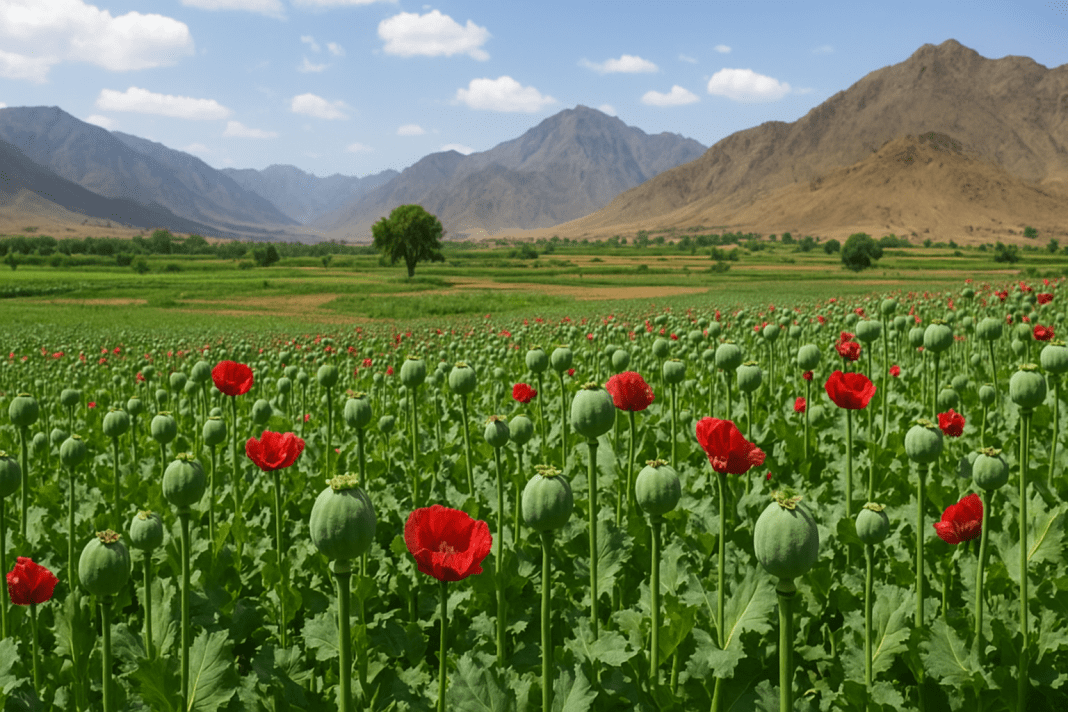During the long war in Afghanistan, the United States fought many visible battles — against the Taliban, against terrorism, and for control of a fragile nation. But behind the scenes, another secret war was unfolding — one that targeted Afghanistan’s powerful opium trade.
A Hidden War in the Opium Fields
The Central Intelligence Agency (CIA) launched a secret operation to weaken the country’s opium industry, which had become one of the main sources of income for armed groups. For more than a decade, the agency dropped billions of modified poppy seeds from airplanes across Afghan farmland. These seeds were designed to grow poppies that looked normal but produced almost no morphine, the key ingredient in heroin.
This covert plan began around 2004 and lasted for over ten years. It was so secret that even some top officials in Washington and Kabul had no idea it existed. The CIA obtained legal permission through a special classified document signed by the U.S. president.
Afghanistan Rocked by Fierce Pakistan Air Raids Devastating TTP Hideouts
At that time, Afghanistan was the world’s largest producer of opium, providing most of the heroin that reached Europe and Asia. The drug trade fueled corruption and helped fund the Taliban’s weapons. American officials feared that as long as the opium business thrived, Afghanistan’s peace and stability would remain out of reach.
Seeds of Secrecy and the Fight Against Opium
The CIA’s plan focused on using science instead of force. Scientists working with the agency developed a special kind of poppy plant through years of selective breeding. Unlike traditional poppies, these plants produced little to no morphine. They also sprouted earlier and had striking red flowers, which made them appealing to Afghan farmers.
The idea was simple: if these modified poppies spread and mixed with native plants, the opium harvested from Afghan farms would slowly lose its strength. Drug traffickers would find it less profitable, and farmers might move away from opium farming altogether.
In late 2004, British C-130 aircraft were used for nighttime missions over the provinces of Helmand and Nangarhar, Afghanistan’s biggest poppy-growing areas. Hidden from view, the planes released billions of modified seeds across the fields. The CIA hoped that farmers would unknowingly replant the new seeds, gradually changing the nation’s opium crop from within.
Canadian judge on ICC sanctioned by U.S. for role in Afghanistan war crimes probe
Very few people within the U.S. government knew about the operation. The Afghan government was never told. To measure progress, intelligence teams used satellite images and intercepted conversations among farmers and traders. In some cases, undercover agents visited poppy fields under the guise of routine agricultural surveys to check if the low-morphine plants were spreading.
For a few years, reports suggested the plan had some success. Some Afghan farmers noticed their poppy plants weren’t producing as much opium as before. Others started pulling out unproductive crops. Intelligence officials described the mission as a rare example of “non-military innovation” — a quiet attempt to damage the heroin industry using biology rather than bombs.
An Expensive Experiment That Faded Away
Despite its creative approach, the CIA’s opium mission faced major challenges. While it may have temporarily weakened some crops, the results were not long-lasting. By the mid-2010s, the project became too costly to continue. The CIA’s counternarcotics budget was shrinking, and other departments — including the Pentagon and the State Department — refused to take over funding.
The operation quietly ended around 2015. It had cost millions of dollars but produced limited lasting results. Even as the CIA dropped seeds, other U.S. agencies argued over different ways to stop the opium trade. Some wanted to spray fields with herbicides, while others suggested buying poppy crops and converting them into legal medicine. But Afghan leaders opposed spraying chemicals, fearing harm to their soil, water, and food supply.
The overall war on opium in Afghanistan turned out to be one of the most difficult battles of the U.S. campaign. Over two decades, the United States spent nearly $9 billion trying to end the heroin trade, but cultivation continued to rise and fall. At its peak, opium made up nearly 15 percent of Afghanistan’s economy.
Borderline Crisis: Pakistan and Afghanistan Descend Into Conflict
Even after U.S. forces withdrew in 2021, the opium trade remained deeply rooted. The Taliban government later announced a ban on poppy farming, and cultivation dropped sharply for a year. But the ban didn’t last — farmers soon returned to the crop, and new growing areas appeared in the country’s northeast.
The CIA’s secret seed operation remains one of the most unusual stories from the war in Afghanistan — a mission that tried to fight opium not with guns or chemicals, but with seeds and silence. It revealed how far intelligence agencies were willing to go to weaken the world’s heroin supply, one poppy field at a time.
